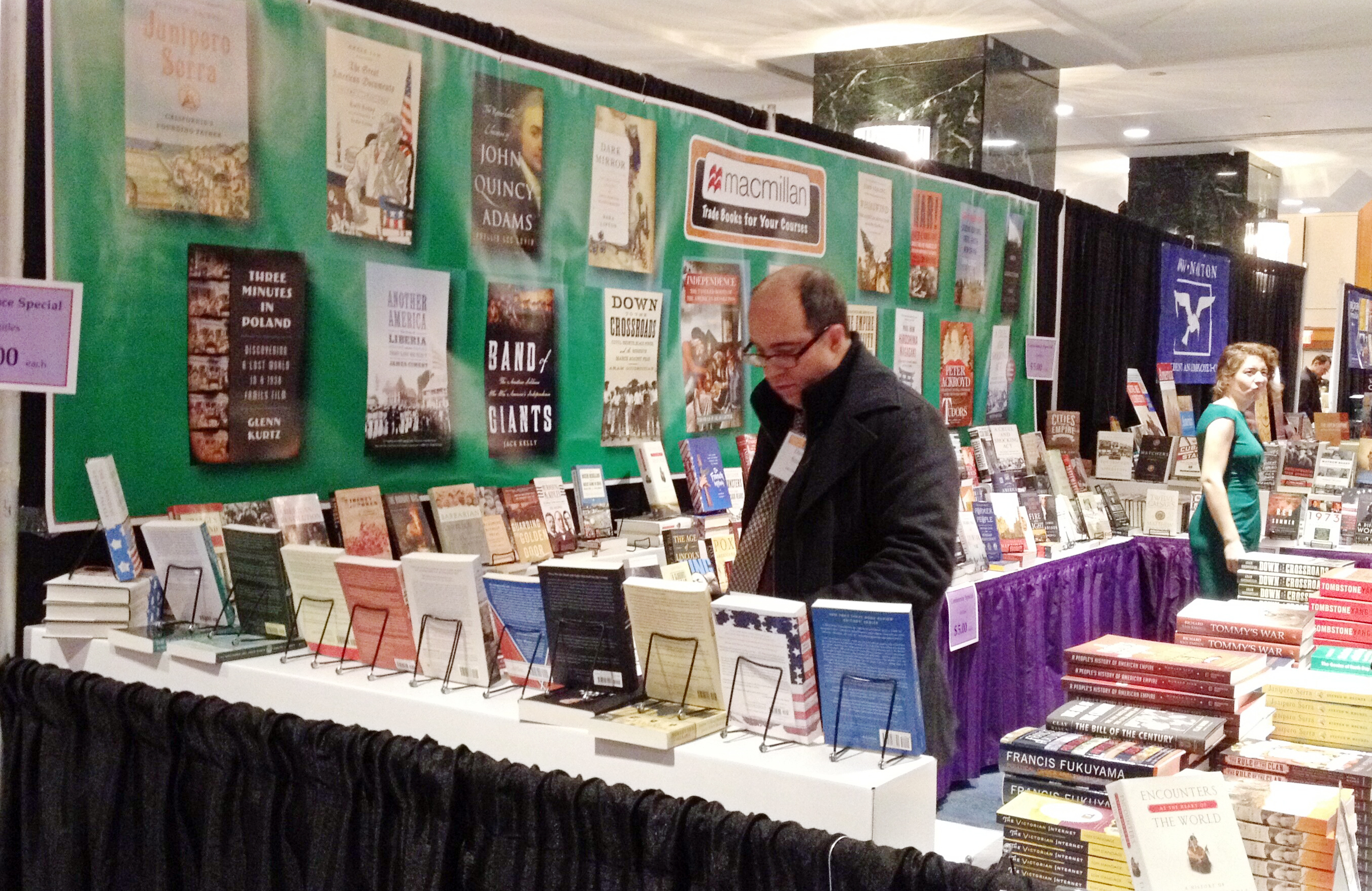American History Association holds annual meeting

Publishers’ exhibits were held in the 129th Annual Meeting of AHA, where the latest journals, books as well as online resources in the field of history were exhibited. (Chu Guofei/CSST)
The American History Association (AHA) held its 129th annual meeting in New York City from Jan. 2 to 5. The theme for this year is “History and the Other Disciplines.” More than 5,000 historians in various fields, professors, librarians, teachers, graduates and other participants took part in various discussions about encounters and exchanges with other disciplines and revisited the history of the disciplines themselves.
AHA President-elect Jan E. Goldstein of the University of Chicago, 2015 Program Committee Chair Francesca Trivellato of Yale University, and Co-Chair Andrew Sartori of New York University said that the ways in which historians study, write and teach history have changed dramatically in the past hundred years or so because of influence from other disciplines.
A rich array of more than 300 sessions as well as other poster sessions, roundtables, luncheons, receptions and tours over four days brought great opportunities for participants to satisfy their intellectual curiosity, stimulate their professional interests and network with colleagues.
"History and Other Disciplines"
In the interwar period, interactions among a few French historians and geographers, among others, gave rise to what became known as the Annales School. Since then, social history has maintained a close dialogue with economics, demography and anthropology. Intellectual history has long had ties with political theory and philosophy, and political history with political science. In the 1980s, literary theory, cultural anthropology and psychoanalysis nourished the new cultural history. And the list could go on. Meanwhile, computer science and new technologies continue to transform our modes of collecting, reading and interpreting material and textual data.
A panel on “History of the Human Sciences” explored the history of the human sciences from a comparative and interdisciplinary perspective. Panelists addressed their own contributions to the historiography of the human sciences within a broader meta-analytic framework, exploring such key concepts as critical realism, race and practice.
Alice Conklin, a professor from Ohio State University, suggested new directions emerging in the history of anthropology to emphasize anthropology’s liberating potential in the past as well as its darker side.
Sanjay Seth of Goldsmiths, University of London, examined genealogies of knowledge production that reverse the boundaries of the West and the non-West, and he questioned if historians are right to assume that modern Western knowledge transcends the circumstances of its historical and geographical context, thereby making the human sciences “true” for everyone. Doing so would privilege modern and Western ideas over the pre-modern and the non-Western, he added .
In a panel “Innovation in Digital Publishing,” the speakers explored new ways researchers of humanities are working and creating literature. Open access and its implications became one of the focuses during the debate.
Matthew Gold, a professor from City Tech and City University in New York and author of Debates in the Digital Humanities, which has an online open-access edition, said that an open-access journal makes articles freely available. Instead of losing income, authors actually benefit. Articles that are easier to find and free to read attract more readers, generate more discussion and get cited more in later articles.
However, there were also some concerns about the down-sides to open-access publishing. Cecil Marden, Wellcome Trust Open Access project manager, pointed out that the challenge is not finding the money to pay for open access but rather flipping the way money enters the publishing system to enable publishers to innovate sustainably.
In addition, publishers’ exhibits were held at the same time. More than 80 academic publishers brought their latest journals, books as well as online resources. This offered a comprehensive picture of recent studies and cutting-edge research in various fields in history.
James Grossman, the AHA’s executive director and a professor from the University of Chicago, said people had an opportunity to learn more about professional development, teaching and digital history.
“I have been very proud of my colleagues in putting together the programs that have those new elements. For example, we have submissions called Lightning Round—people doing one-or-two-minute presentations. So it is not only the subject sessions that are new but also the performances.”
Chu Guofei is a reporter at CSST based in Boston.
